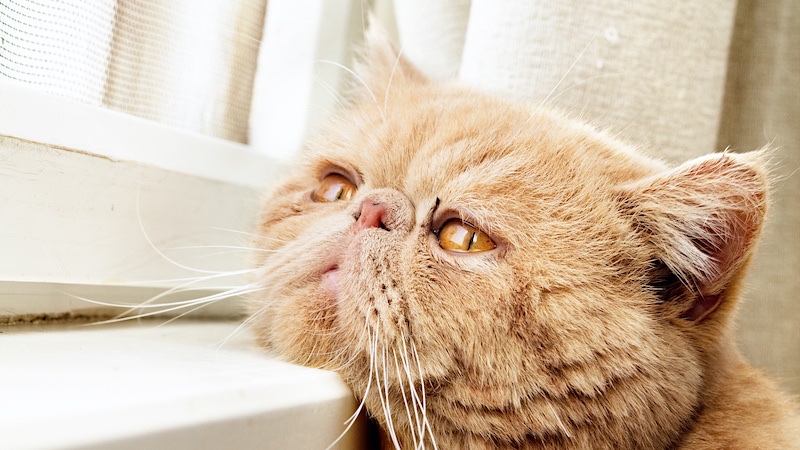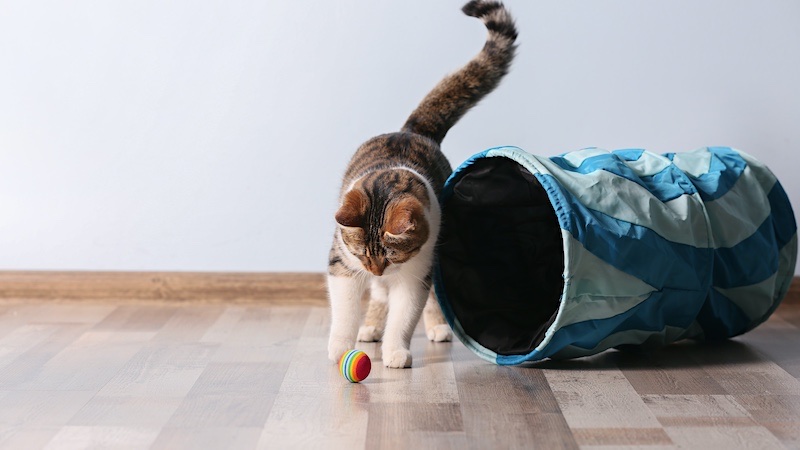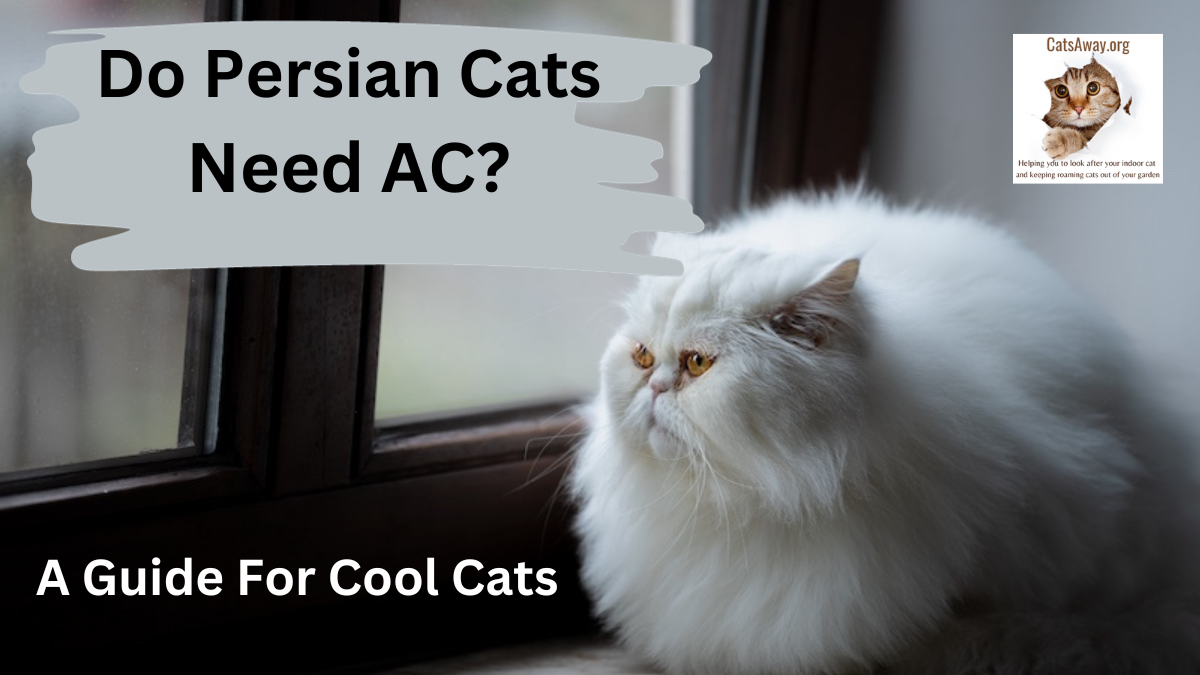Keeping an indoor cat happy, especially a breed not suited to the indoor life, can be a challenge and if you’re a responsible cat owner, it will undoubtably have crossed your mind……
Do indoor cats get depressed? The answer is yes, an indoor cat can become depressed due to a lack of stimulation and environmental enrichment. However, with some simple changes to your cat’s routine and environment, you can help prevent depression and ensure your sad cat can soon become happy again.
Read on to learn more about cat depression and how to ensure your cat stays mentally healthy.
One of the main reasons indoor cats can become depressed is due to boredom and lack of stimulation. Cats are natural hunters and need opportunities to engage in activities that mimic hunting and exploring.
Providing your cat with plenty of toys, a cat tree, a few scratching posts and interactive playtime can all help keep them mentally stimulated and prevent boredom.
In addition to providing environmental enrichment, it’s important to ensure your cat has access to plenty of natural light and fresh air. Just like us, a lack of sunlight can contribute to depression and other health problems.
Consider setting up a window perch where your cat can bask in the sun and get some fresh air. Better yet, invest in a decent outdoor cat enclosure so your cat can get outdoors every day without the risks associated mixing with feral and other outdoor cats.
Understanding Cat Depression

When Do Indoor Cats Get Depressed?
Indoor cats can become depressed for various reasons. Some common causes include a lack of stimulation, boredom, loneliness, and changes in their environment. Cats are creatures of habit, and any significant changes in their routine or surroundings can trigger depression.
For example, moving to a new house or the loss of a family member or another pet can often lead to depression in cats.
If your indoor cat is obsessed with going outside chances are they want to mate or hunt. If you haven’t yet, consider having your cat neutered or spayed. If they have already been altered then a dash for the open door could be caused by them being upset with something in the house.
This could be as simple as a new washing machine that’s louder than the previous one or the introduction of a new family member or pet. Try these training techniques to help stop them attempting to run away.
Symptoms of Depression in Indoor Cats
It can be challenging to determine whether your indoor cat is depressed, as they are naturally solitary animals and may not show obvious signs of depression. However, some common symptoms of feline depression include a lack of interest in food or play, lethargy, hiding, excessive sleeping, and decreased grooming.
If you notice any of these symptoms in your cat, it is essential to take action to help them feel better. One way to ensure your indoor cat does not become depressed is to provide them with plenty of stimulation and enrichment.
This could be as simple as adding a cat tree into the house. You can also create a designated area for your cat and spend time playing with them regularly. Another way to prevent depression in indoor cats is to maintain a consistent routine.
Cats thrive on routine, and any significant changes to their schedule can be stressful and trigger depression. Try to keep their feeding and play times consistent and avoid making any sudden changes to their environment.
In conclusion, while indoor cats can become depressed, there are many ways for a pet owner to prevent and treat feline depression. By providing your cat with plenty of stimulation and maintaining a consistent routine, you can help ensure they stay happy.
How to Ensure Your Indoor Cat Doesn’t Get Depressed
Provide Adequate Stimulation
Indoor cats need mental and physical stimulation to stay happy. Provide your cat with opportunities to climb, jump, run and play. Rotate their toys regularly to keep them interested, and consider using puzzle feeders to provide mental stimulation while they eat.
Another way to prevent cat depression is to ensure you make time to spend with your cat for a minimum of 20-30 minutes a day. Use a variety of toys, such as feather wands, laser pointers, and balls, to keep them engaged.
Consider buying a cat wheel such as the one below as this will not only provide mental stimulation but also give your cat the exercise they need to maintain a healthy weight.
 Cat Exercise Wheel for Indoor Cats
Cat Exercise Wheel for Indoor Cats
With its sturdy base this makes an ideal fast cat exercise wheel. If you have high energy cats this could well be the ideal cat wheel for your pets.
- The Cat Exercise Wheel is made of durable wood and has a solid, sturdy design that can withstand even the most active cats
- The Cat Exercise Wheel also doubles as a scratching board, with sisal rugs lining the inside and outside of the wheel for added grip and scratching
- While the Cat Exercise Wheel is relatively quiet, it's not completely silent and may make some noise when in use
Create a Safe and Comfortable Environment
An indoor cat needs a safe and comfortable environment to feel happy and secure. Make sure your house plants are safe for cats and use a window screen so you can leave a window open safely.
Provide your cat with a cozy bed, a litter box in a quiet location, and always ensure they have access to plenty of fresh water.
Cats also need vertical space to help them feel secure. Consider installing shelves or cat trees that allow your cat to climb and perch up high, where they can observe their surroundings and feel safe.
Maintain a Consistent Routine
Cats thrive on routine, so it’s important to maintain a consistent schedule for feeding, playtime, and bedtime. Keep their litter box clean and in the same location, and provide them with regular mealtimes. This will help your cat feel secure and reduce their stress levels.
Try to keep your cat’s routine consistent even when you’re away from home. Use timed feeders and automated toys to keep your cat entertained and on a regular schedule.
Consider Adopting Another Cat
If you have the resources and time, consider adopting another cat to keep your indoor cat company. Cats are social animals and often enjoy the company of another feline. Watch for the warning signs when introducing the cats and provide separate resources for each cat, such as food bowls and litter boxes.
Keep in mind that your pet may not get along with other cats, so it’s important to monitor their interactions and separate them if necessary. If you’re not sure if your cat would benefit from a companion, consult with your veterinarian or a cat behaviorist.
Ensuring Your Indoor Cat’s Happiness

While indoor cats can sometimes become depressed (as can outdoor cats), there are plenty of things you can do to ensure your feline friend is happy and content. Here are some tips:
Provide plenty of mental and physical stimulation through interactive toys, environmental products, and catification
Establish a play regimen of at least 20-30 minutes a day
Consider getting another cat as a playmate, as long as they get along well
Set up perches and climbing structures to give your cat a sense of vertical space
Make sure your cat has access to natural light and fresh air by opening windows or creating a screened-in porch
Add an outdoor cat enclosure to your garden so your pet can enjoy the great outdoors safely
Provide hiding places, such as cardboard boxes or cat tunnels, to give your cat a sense of security
Establish a routine for feeding, playtime, and cuddles to give your cat a sense of predictability and security
Consider using calming pheromone sprays or diffusers to help your cat feel more relaxed
By following these tips and providing your indoor cat with plenty of love and attention, you can help ensure they stay happy and healthy for years to come.





